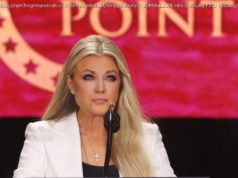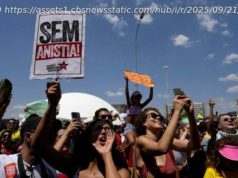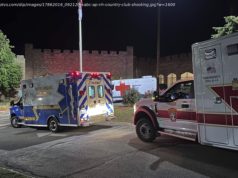His acquittal has reinvigorated support on the right for armed responses to racial justice protests and unrest.
On Friday, as Kyle Rittenhouse stood in a courtroom in Kenosha, Wis., awaiting the verdict in his trial, a large bald man with mutton chop sideburns sat in a pew several rows behind him. As a court clerk announced Mr. Rittenhouse’s acquittal on all charges, a faint smile passed across the man’s lips. “I’m walking on sunshine,” the man, Kevin Mathewson, said the next day. A local private investigator and former city alderman, he had attended every day of the trial, in which he had more than a passing interest. Mr. Mathewson had become a prominent and divisive figure in Kenosha. Days after George Floyd was killed by a police officer in Minneapolis, Mr. Mathewson had created an organization called the Kenosha Guard, an armed group that declared its intent in a Facebook post “to deter rioting/looting” amid racial justice demonstrations in Kenosha. In August 2020, after the police shooting of a Black man named Jacob Blake brought a wave of protests and rioting to the city, Mr. Mathewson had written on the Guard’s Facebook page urging Kenoshans to take to the streets with guns to defend the city. His Aug.25 post went viral, drawing thousands of RSVPs and comments threatening violence. Mr. Mathewson’s call to arms was one of several in Kenosha that day, which collectively brought dozens of mostly white armed paramilitaries into the streets of the city’s small downtown, creating a heavily armed confrontation with demonstrators that came to a head with the Rittenhouse shootings. Mr. Mathewson went home hours before the shootings, and no evidence ever connected Mr. Rittenhouse — whom Mr. Mathewson said he had never met — to his Facebook post. But his proximity to the incident led to him being banned from Facebook, where his Aug.25 post had been flagged repeatedly for violating the platform’s ban on militia activity and had left an aura of suspicion around him. Now that Mr. Rittenhouse had been acquitted, Mr. Mathewson felt cleared by association. “It vindicates Kyle,” Mr. Mathewson said. “I felt vindicated by it.” And, he went on, “It vindicates people that say, ‘Look, no one’s coming to help, we have to help ourselves.’” The Rittenhouse shootings, and the clash between paramilitaries and demonstrators in which they occurred, represented the lethal culmination of this idea: that the United States had reached a point of crisis in which citizens were required to take up arms to defend it from their fellow citizens. It was an idea with deep roots in American history, and also one deeply entangled with the country’s legacy of racial conflict. White vigilante groups, some of them openly white supremacist, responded violently to unrest in Black communities in multiple cities in the late 1960s, often with the acquiescence or active support of local police. Photographs of armed Korean American business owners in Los Angeles defending their properties during the 1992 riots have been touchstones for Second Amendment advocates for years, and they were circulated again as social media memes after the Rittenhouse verdict. In 2020, this strain of armed vigilantism was reactivated by the struggles of mostly Democratic state and local governments and law enforcement in responding to rioting and prolonged unrest in several major cities after Mr. Floyd’s death. And it was fanned by conservative media figures and Republican politicians, who encouraged their audiences and supporters to see the failure to preserve order as part and parcel of the Democratic agenda.






